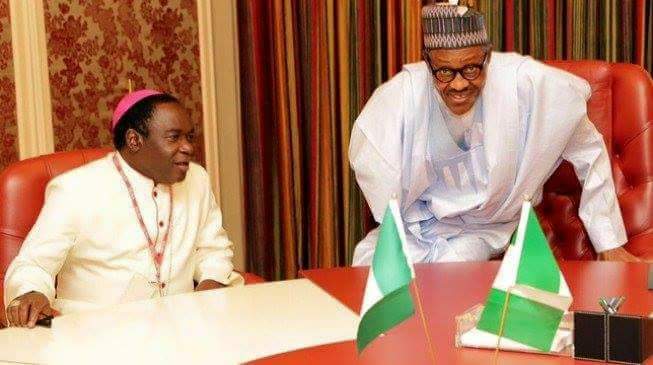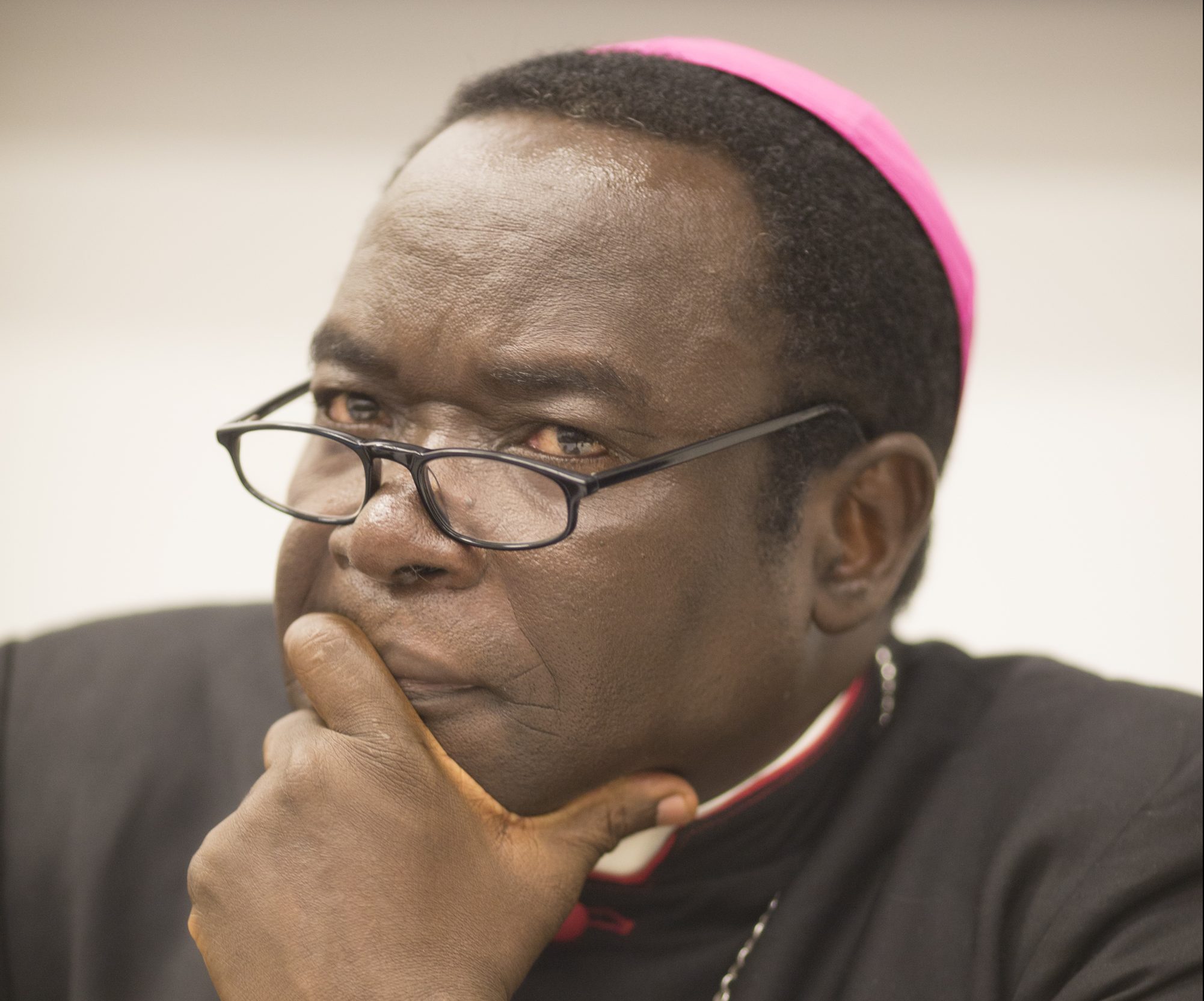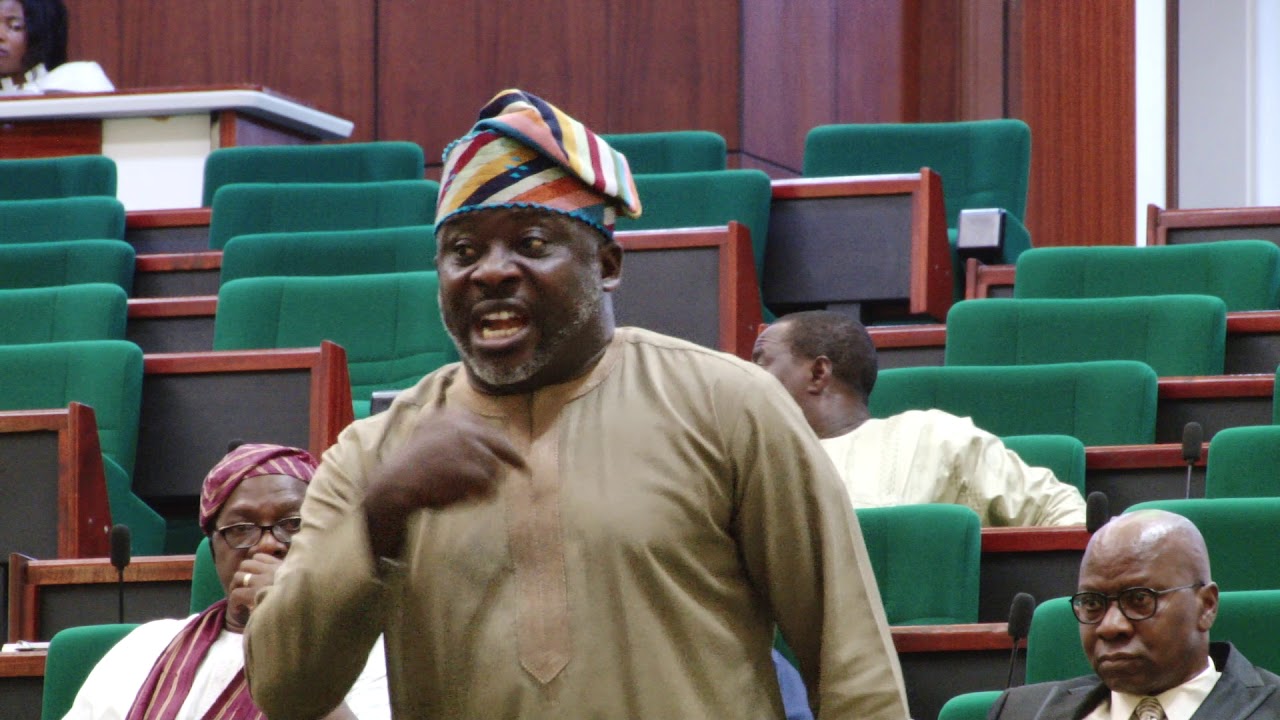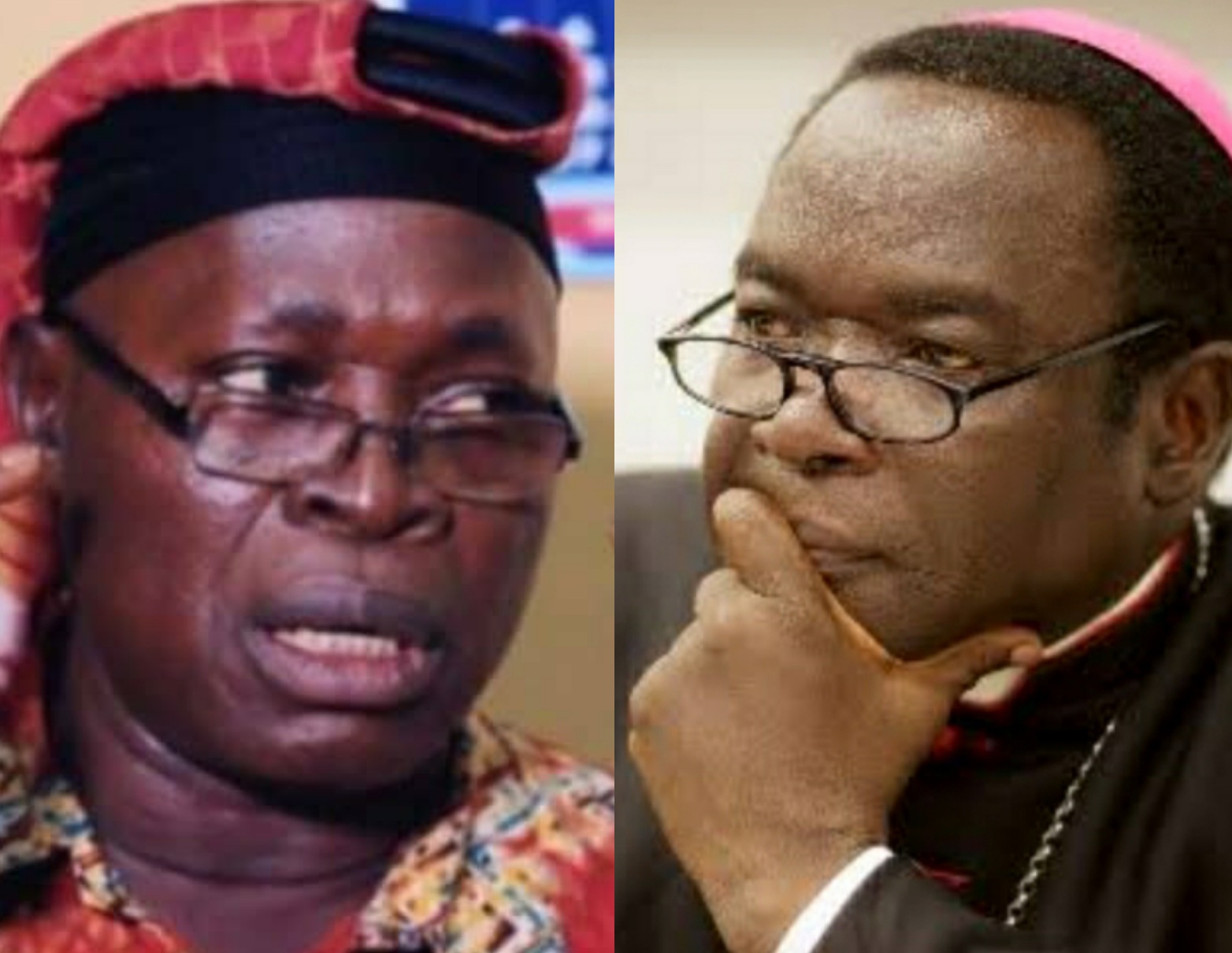Outspoken Bishop Catholic Diocese of Sokoto, Most Rev. Matthew Hassan Kukah in his Christmas Homily slammed President Muhammadu Buhari over the state of the nation.
Kukah also came for President’s Special Adviser on Media and Publicity, Femi Adesina over his often use of the word ‘wailers’ to describe those who are not on the same page with the Buhari administration.
In the speech, entitled “A Nation in search of Vindication”, Kukah railed at Buhari’s unparalleled nepotism and policy of northern hegemony, while reducing other parts of the country to second class status.
He said there could have been a coup or war in the country if a non-Northern Muslim President had practiced a fraction of President Muhammadu Buhari’s ‘nepotism’.
He said despite Buhari’s policy, the north has been the worst for it.
With terrorism, banditry and kidnapping ravaging Nigeria under Buhari’s watch, the bishop said, everybody is now wailing over the sad situation.
“The United Nations has wailed. The Pope has wailed. Cardinals, Archbishops, Bishops, Priests, Pastors have wailed. Emirs have wailed. Politicians have wailed. The Sultan has wailed”, he said.
Read the full speech:
A Nation In Search of Vindication
Another Christmas with Dark Clouds of Death:
Let me paraphrase the holy prophet Isaiah who said: “For Jerusalem (Nigeria’s sake), I will not be silent until her vindication shines forth like the dawn…..No more shall people call you forsaken, or your land desolate, but you shall be called my delight and your land espoused.” (Is. 62:1, 4).
Against the backdrop of our endless woes, ours has become a nation wrapped in desolation. The prospects of a failed state stare us in the face: endless bloodletting, a collapsing economy, social anomie, domestic and community violence, kidnappings, armed robberies etc. Ours has become a house of horror with fear stalking our homes, highways, cities, hamlets and entire communities. The middle grounds of optimism have continued to shift and many genuinely ask, what have we done to the gods? Does Nigeria have a future? Where can we find hope? Like the Psalmist, we ask; from where shall come our help? (Ps.121:1).
Whatever the temptations to despair, we cannot to give up. When the Psalmist asked where help shall come from, he answered that it will come from the Lord. Therefore, like Zachariah, the father of John the Baptist, we Priests must stand before the mercy seat of God and plead the cause of our great country(Lk. 1: 8). Like Abraham, we must plead for the Lord to save our nation because we have more than ten righteous men (Gen. 18: 16ff). Like Moses, we believe that as long as our hands are held up in prayer, the Lord will be on our side (Ex. 17:11). These are trying but life changing moments in the history of our nation. Politics and Economics alone will not resolve our problems. There is enough hate and bitterness to go around. We need to pause, reflect, pray, be honest and courageous in facing tomorrow.
Yes, our dreams have been aborted. Yes, our commonwealth has been stolen. Yes, our cancer of corruption has metastasized. Yes, we have been guilty of patricide, fratricide and attempted even suicide. Yes, we are hungry, angry, thirsty and starving. Yet, we stand firmly with the unshaken belief that no matter the temptations, the world has known worst times. These may be the worst of times, but for men and women of faith, they could be the best of times. We must stand firm and resolute because, our redeemer liveth (Job 19:25).
Annus Mirabilis or Annus Horribilis?
The roads to the grave yards are busier than those to the farms. Amidst the wails and laments, I hear the congregants saying; the world is coming to an end, it has never been so bad.Yes, people are dying, but they are not dying more now than they did in recent years. It is the social media and its connectivity that has given us a sense of greater urgency and added to our seeming despair with the way things are. The social media is value neutral.It depends on what we make of it. Its instantaneous impact is often times dizzyingly traumatic, but the other benefits more than compensate. In a way, the choices we make will help us decide whether this year is our annus mirabilis or annus horribilis.
When Isaac Newton, at the age of 23, made the spectacular discoveries in the areas of Calculus, Motion, Optics, and Gravitation, the year of those discoveries, 1666, was referred to as, annus mirabilis, the year of joy. On the other hand, in 1992, when the marriages of three of her children collapsed, Queen Elizabeth in her Christmas address referred to that year as her annus horribilis, the year of horror. As such, notwithstanding all the earth shaking impact of the Covid-19, our own individual, communal and national tragedies, it is not just a choice between annus mirabilis and annus horribilis. At various levels, there have been grey areas of hope, flickers of light, achievement and so on. It is to these flickers of hope that we must cling tenaciously. For our son, Anthony Joshua, the loss of his title to Andy Ruis on June 1, 2019 after 25 fights without a loss, that year was his annus horribilis. When he pummeled Kubrat Pulev, this year became his annus mirabilis. Things change and, joy or sorrow, we must know that nothing lasts forever. What matters is how we handle failure.
Another Christmas in Cloud of Doom:
Not unexpectedly, this Christmas is again coming against a backdrop of so much pain, sorrow and uncertainty in our land. We all seem to have become sedated and inured to pain. Tragedy has been standing as our gate keeper. For over ten years now, at almost each Christmas, a dark pall of horror, sorrow and death has consistently hung in our horizon threatening to eclipse the promises of the joy of Christmas. Recall the bombing of St. Theresa’s Catholic Church, Madalla on Christmas day in 2011. In the wake of the Christmas day bombing, I issued a statement titled, An Appeal to Nigerians. In the statement which enjoyed a wide circulation, I stated: All of this should cause us to pause and ponder about the nature of the force of evil that is in our midst and appreciate the fact that contrary to popular thinking, we are not faced with a crisis or conflict between Christians and Muslims. Rather, like the friends of Job, we need to humbly appreciate the limits of our human understanding. Terror is a product of hate, but while hate tries to divide us, terror and death should pull us together.
Is Government in Suspended Animation?
As our country drifts almost rudderless, we seem like people travelling without maps, without destination and with neither Captain nor Crew. Citizens have nowhere to turn to. After he assumed power, a delegation of the Catholic Bishops’ Conference had audience with President Buhari. In the course of our discussion, the President shared with us his frustration over the state of decay and rut that he had met. In frustration, I vividly recalled him saying that, from the decay and neglect, it seemed as if preceding governments had been doing nothing but just eating and going to the toilet! Looking back, one might conclude that those were happy times because at least there was food to eat and people could go to the toilet. Now, a journey to the toilet is considered by the poor an extra luxury. Our country’s inability to feed itself is one of the most dangerous signs of state failure and a trigger to violence.
Breaking the Ice: From Chibok through Dapchi to Kankara:
The sleepy town of Kankara, just 130 kilometers outside Katsina, like Chibok and Dapchi before it, has leapt into prominence not because they now have potable water, electricity or any dramatic improvement in the quality of their lives. Rather, it is because of large footprints of the evil men who have passed through their terrain. As always, we were unsure of how many children were missing: 80, 820, 800, 500, 520, 333, 320, no one knew. The numbers kept changing between the government and Boko Haram.
The story of Chibok and Dapchi was for some time, a metaphor that exposed the vulnerability of the girl child. Kankara has added to the mix and now we have to face the mortal dangers of the Nigerian child in northern Nigeria. The Almajiri is the poster child of the horrible and inhuman conditions of the northern child. It is a best kept secret that the region refuses to confront but it has now exposed its underbelly. Now, what next for the children of the north? In another ten or twenty years, these children will be leaders in their communities. What will they remember and how will they remember? Their fate and future are a dream deferred, a nightmare that will be ignited by the fire next time.
We thank God that the children have been returned safely. This is the easy part. The challenge now is how to deal with the scars inflicted by a derelict nation which is still unable or unwilling to protect its citizens. Yes, we commend the federal and state governments for the rescue operation. The larger issues now are whether the federal government understands the evil web of intrigues into which Boko Haram has tied it. Will the federal government continue to reward and fund Boko Haram by playing its game? How long can this circle of deceit last for given that every kidnap merely strengthens their arsenal? The men of darkness have shown far greater capacity to shock and awe a forlorn nation by constantly blindsiding us all. When will it all end?
Will the federal government continue to reward and fund Boko Haram by playing its game? How long can this circle of deceit last for given that every kidnap merely strengthens their arsenal? The men of darkness have shown far greater capacity to shock and awe a forlorn nation by constantly blindsiding us all. When will it all end?
A Nation in Search of Vindication.
This government owes the nation an explanation as to where it is headed as we seem to journey into darkness. The spilling of this blood must be related to a more sinister plot that is beyond our comprehension. Are we going to remain hogtied by these evil men or are they gradually becoming part of a larger plot to seal the fate of our country?
President Buhari deliberately sacrificed the dreams of those who voted for him to what seemed like a programme to stratify and institutionalise northern hegemony by reducing others in public life to second class status. He has pursued this self-defeating and alienating policy at the expense of greater national cohesion. Every honest Nigerian knows that there is no way any non-Northern Muslim President could have done a fraction of what President Buhari has done by his nepotism and gotten away with it. There would have been a military coup a long time ago or we would have been at war. The President may have concluded that Christians will do nothing and will live with these actions. He may be right and we Christians cannot feel sorry that we have no pool of violence to draw from or threaten our country. However, God does not sleep.We can see from the inexplicable dilemma of his North.
Every honest Nigerian knows that there is no way any non-Northern Muslim President could have done a fraction of what President Buhari has done by his nepotism and gotten away with it. There would have been a military coup a long time ago or we would have been at war.
Nepotism and the Worship of False Gods.
It is curious that President Buhari’s partisanship and commitment to reinforcing the foundations of northern hegemony have had the opposite consequences. For a long time, beyond the pall of politics, very prominent northerners with a conscience have raised the red flag, pointing out the consequences of President Buhari’s nepotism on national cohesion and trust.
With time, as hunger, poverty, insecurity engulfed the north, the President’s own supporters began to despair and lament about the state of their collective degradation. Was this not supposed to be their song? The north that the President sought to privilege has become a cauldron of pain and a valley of dry bones. Today, the north itself is crying the most and why not? No one has suffered as much as they have and continue to. The helplessness is palpable and the logic is incomprehensible.
One Northern Imam after the other have posted videos of lamentation on the social media asking why, with all the cards of power in the hands of northern Muslims, everything is bursting in the seams. How come our region has become a cesspool of blood and death? Why did President Buhari hand over a majority of the plum jobs to Northern Muslims? Was it for efficacy and efficiency? What was the logic? President Buhari must pause and turn around because his policy of nepotism has been rejected by the gods.
During the EndSARS Protests, the north pretended that it was ensconced from the pain that was driving the protests and that they had nothing to complain about. The northern elites claimed that the protests were part of a plot by Christians to overthrow a northern, Muslim government. Their sentiments false, but understandable. However, it turned out to be the lull before the storm. The dam soon broke as the bandits tightened their grip on the region as the spiral of kidnappings, abductions and killings of innocent citizens intensified.
During the EndSARS Protests, the north pretended that it was ensconced from the pain that was driving the protests and that they had nothing to complain about. The northern elites claimed that the protests were part of a plot by Christians to overthrow a northern, Muslim government. Their sentiments false, but understandable. However, it turned out to be the lull before the storm
The North spurn into denouement: the idea of a united north seems to have ended. The northern Governors’ Forum has split into the three zones. With the killings, kidnappings and abductions of Emirs and other traditional rulers in the north, the signals have gone out that no one is safe and nothing is sacred. In the wake of the EndSARS protests, the traditional rulers across the country assembled to express solidarity with the President. Then it all changed. The Emir of Katsina, the President’s home state, only recently said; “We cannot continue to live like animals. I have not seen this type of country”. His Eminence, the Sultan of Sokoto, Alhaji Sa’ad Abubakar said that the north has now become the worst part of the entire country. The Senate whose leadership is almost totally dominated by Northern Muslims has raised alarm. The Northern Elders’ Forum has called on the President to resign. Has the politics of nepotism run its course? Perhaps, the spirit of Christmas should offer us an answer.
The People that Walked in Darkness have seen a Great Light.
The rut and decay in our country today is evidence of a people who have not yet seen the light. The experience of northern Nigeria is evidence that nepotism is a counterfeit currency. The nation must therefore now pull together. It is not enough to blame the military. After all, they neither run the economy or the bureaucracy. It is not enough to blame even the political class or even the President alone. We found our way here by the choices we have made as a nation over time.
Indeed, the colonialists claimed that they were bringing light to a dark continent. In a way, despite the cost, we could see ingredients of their light; good education, running water, relatively good roads, security, among others. We finally accepted Democracy as the platform for actualizing these.
However, today, there is evidence that we have literally returned to the cave, those times when life was brutish, nasty and short. Each and every one of us has contributed to the darkness of our nation. The light of Christ which we all received at baptism calls on us to act in the mind of Christ. To be a follower of Christ is to be in his footsteps. This moment calls on us as Christians to celebrate the simplicity of Christ represented in Christmas. Joy to the world, the Lord has come, the song says. Jesus has offered us a roadmap. We are challenged to bring light into the darkness of our society.
Darkness has its own logic. St Paul reminds us that without Christ, our lives are characterized by: immorality, filthy and indecent actions, worship of idols and witchcraft. People become enemies and they fight, they become jealous, angry, and ambitious. They separate into parties and groups, they are envious, get drunk and have orgies (Gal. 5: 19-21). When it is dark, we cannot see our way and we stumble. Nigeria has stumbled so much. It is time to for us to turn on the light of the torch. Each of us can make a change.
Wailers and Redeemers.
Finally, today, amidst the pains and the trials, we can say with the Psalmist: Our tears have become our bread (Ps. 43:2). We have no reason to doubt that at the fulfilment of time, in His own time, the Lord will dispense justice to our nation. It will come as day follows light.
Our brother Femi Adesina, a Pastor of the Four-Square Gospel Church was right when he referred to those who were calling attention to our situation as Wailers.The wailing started quite early in the day. To the herdsmen across Nigeria whose cattle have been lost to rustlers, bandits, or lightening, the Prophet Zechariah said: There is a sound of a shepherd’s wail for their glory has been ruined (Zech 11:3). To the thousands of widows left to mourn their husbands or children across our country, the Prophet Jeremiah is saying; Send for the wailing women, that they may come! Let them make haste and take up a wailing for us, that our eyes may shed tears and our eyelids flow with water (Jer. 9: 17). For our helpless nation overrun by bandits? Prophet Jeremiah still says; A voice is heard in Ramah, mourning and great weeping, Rachel weeping for her children and refusing to be comforted, because they are no more (Jer. 31:15).
So, Pastor Adesina was right. On the sad situation in Nigeria, the United Nations has wailed. The Pope has wailed. Cardinals, Archbishops, Bishops, Priests, Pastors have wailed. Emirs have wailed. Politicians have wailed. The Sultan has wailed. Surely, it is time for the Lord to hear the wailer as they have sung their redemption songs
So, Pastor Adesina was right. On the sad situation in Nigeria, the United Nations has wailed. The Pope has wailed. Cardinals, Archbishops, Bishops, Priests, Pastors have wailed. Emirs have wailed. Politicians have wailed. The Sultan has wailed. Surely, it is time for the Lord to hear the wailer as they have sung their redemption songs. With St. Paul, I say: The hour has come for you to wake up from your slumber because our salvation is nearer now than when we first believed. The night is nearly over, the day is almost here; so let us put aside the deeds of darkness and put on the armour of light (Rom. 13:11-12). Let us unite and seek the Lord in sincerity because the Lord will vindicate the righteous.
Merry Christmas to you all.




![Bishop Kukah rips Buhari, Adesina apart in special Christmas message [Full Speech]](https://thenewsguru.ng/wp-content/uploads/2020/08/femi-adesina-buhari.jpg)